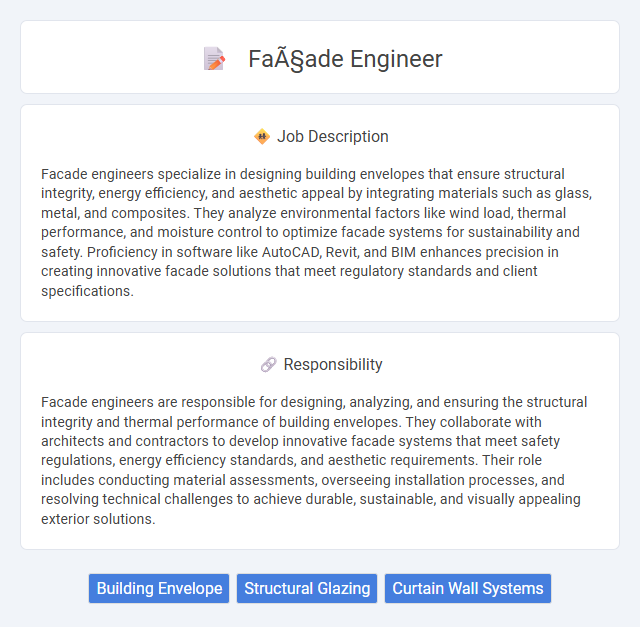
Facade engineers specialize in designing building envelopes that ensure structural integrity, energy efficiency, and aesthetic appeal by integrating materials such as glass, metal, and composites. They analyze environmental factors like wind load, thermal performance, and moisture control to optimize facade systems for sustainability and safety. Proficiency in software like AutoCAD, Revit, and BIM enhances precision in creating innovative facade solutions that meet regulatory standards and client specifications.
Facade engineer roles likely suit individuals with strong analytical skills, attention to detail, and a passion for structural design and materials science. Those comfortable working in collaborative environments and handling complex technical challenges may find this career fulfilling and engaging. People who prefer hands-on problem-solving and continuous learning about building technologies could probably thrive as facade engineers.
Qualification
Facade engineers require a strong background in civil or structural engineering, often holding a bachelor's or master's degree in these fields. Proficiency in software such as AutoCAD, Revit, and structural analysis tools enhances design accuracy and project efficiency. Certifications like LEED or specialized facade engineering courses further validate expertise in sustainable and innovative building envelope solutions.
Responsibility
Facade engineers are responsible for designing, analyzing, and ensuring the structural integrity and thermal performance of building envelopes. They collaborate with architects and contractors to develop innovative facade systems that meet safety regulations, energy efficiency standards, and aesthetic requirements. Their role includes conducting material assessments, overseeing installation processes, and resolving technical challenges to achieve durable, sustainable, and visually appealing exterior solutions.
Benefit
Facade engineers likely enjoy benefits such as competitive salaries and opportunities to work on iconic architectural projects, enhancing their professional reputation. They probably gain valuable experience with advanced materials and innovative building technologies, which can boost career growth. Access to collaborative and multidisciplinary teams may increase their problem-solving skills and job satisfaction.
Challenge
Facade engineer roles likely involve complex challenges related to integrating aesthetic design with structural integrity and environmental performance. Candidates probably face frequent problem-solving scenarios to ensure safety and energy efficiency while managing diverse materials and cutting-edge technologies. Navigating regulatory requirements and coordinating with multidisciplinary teams may present ongoing obstacles that demand innovative thinking and adaptability.
Career Advancement
Facade engineers specialize in designing and analyzing building envelopes, combining structural integrity with aesthetic appeal to optimize energy efficiency and performance. Career advancement in this field often involves transitioning from technical roles to project management, leading multidisciplinary teams, or specializing in cutting-edge materials and sustainable technologies. Mastery of software tools like BIM and gaining certifications in facade engineering or LEED can significantly enhance professional growth and opportunities for leadership positions.
Key Terms
Building Envelope
Facade engineers specialize in the design, analysis, and integration of building envelope systems that ensure structural integrity, thermal performance, and weather resistance. They collaborate with architects and contractors to develop innovative cladding solutions, optimize energy efficiency, and address moisture control and air infiltration challenges. Advanced knowledge of materials science, structural mechanics, and sustainable design principles is essential to delivering high-performance facades for commercial and residential buildings.
Structural Glazing
A facade engineer specializing in structural glazing designs and analyzes glass curtain walls and cladding systems that provide both aesthetic appeal and structural integrity. They ensure the glazing systems withstand wind loads, thermal stresses, and seismic forces while maintaining energy efficiency and waterproofing standards. Expertise in materials science, finite element analysis, and building codes is critical for optimizing performance and safety in modern architectural facades.
Curtain Wall Systems
Facade engineers specializing in curtain wall systems design and analyze complex building envelopes to ensure structural integrity, thermal performance, and aesthetic appeal. They collaborate with architects and contractors to select appropriate materials such as glass, aluminum, and steel, optimizing the curtain wall for load resistance, energy efficiency, and weatherproofing. Expertise in software like BIM and finite element analysis enables facade engineers to model and simulate curtain wall behavior under wind, seismic, and thermal stresses.
 kuljobs.com
kuljobs.com